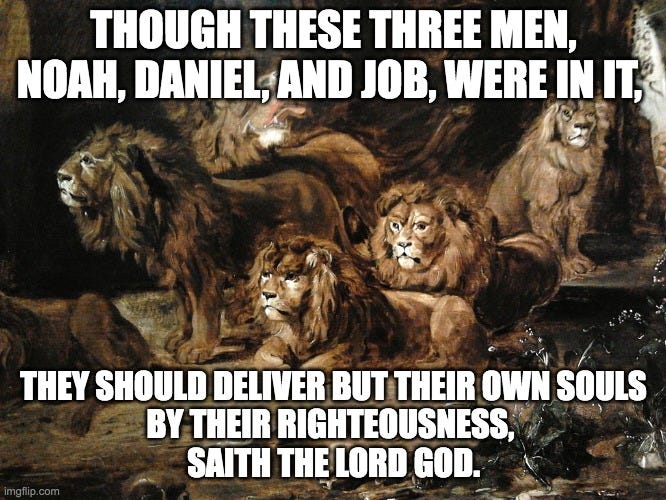Now in the eighteenth year of king Jeroboam the son of Nebat reigned Abijam over Judah. Three years reigned he in Jerusalem. And his mother's name was Maachah, the daughter of Abishalom. And he walked in all the sins of his father, which he had done before him:
and his heart was not perfect with the LORD his God, as the heart of David his father.
Nevertheless for David's sake did the LORD his God give him a lamp in Jerusalem, to set up his son after him, and to establish Jerusalem:
Because David did that which was right in the eyes of the LORD, and turned not aside from any thing that he commanded him all the days of his life, save only in the matter of Uriah the Hittite.
I Kings 15:1-5
When we are reading through the Scriptures, wandering through the various stories of various Godly men in the Old Testament, we will come up upon lots of stories which surprise us (or, would if we hadn’t read them dozens of times already). The patriarch, this man talked about all throughout the rest of Scripture as a Godly man, does something that is not at all according to our norms.
And if we are a normal human being, we put on our judging robes, and try to determine if that weird action by that patriarch was a good or bad thing to do.
Judging the Patriarch
They answered and said unto him, Abraham is our father. Jesus saith unto them, If ye were Abraham's children, ye would do the works of Abraham.
But now ye seek to kill me, a man that hath told you the truth, which I have heard of God: this did not Abraham.
John 8:39-40
I was watching Sporadic Press in his ‘office hours’ and we landed for a while on the question of ‘how do we judge the patriarchs?’. I had already written a couple of posts on the subject, (Judging the patriarchs, Judging the Patriarchs II) which have a lot to say about the issue, but the discussion convinced me that more was needed.
Specifically I want to deal with the ‘silence’ issue. Moderns are forced to admit that the patriarch did the right thing when God literally praises the patriarch specifically for the issue in question, when there is no way to get out of it (see ‘naked’ below). In that case all commentators are forced to, reluctantly, find some way of calling the action good.
Or, when the patriarch does something that we would have called ‘good’ or at the worse ‘neutral’, yet God condemns the patriarch for the thing, and punishes him, we squirm around to find some specific reason why this otherwise good thing (or neutral thing) was, in this particular case, bad.
Walking through the Cases
And spared not the old world, but saved Noah the eighth person, a preacher of righteousness, bringing in the flood upon the world of the ungodly;
II Peter 2:5
Let’s walk ourselves through the various cases so we can see the entire story. We will look, first, at what the patriarch did. Then we will ask how, if you had never read this story and didn’t know how God reacted, you would have reacted. Then let us see how God did, indeed, react. Here are the various possibilities:
So, if the patriarch did some thing, and you thought the patriarch did it right and God praised and rewarded patriarch for doing the thing, cool.
If you thought that the the thing patriarch did was the wrong thing, and God condemns and punishes the patriarch for doing that thing, cool.
But now let’s take a harder case. Suppose the patriarch did something that seemed to you to be a good thing, or at the very least a neutral thing, and God condemns and punishes the patriarch for doing it?
Or, suppose that the patriarch does something that you consider an evil thing, and yet God praises and rewards the patriarch?
In the cases of (3) and (4) our goal should be to revise our initial judgement. When God acts differently, indeed in the opposite direction from what you would have predicted, when He contradicts your judgement… hopefully you will revise your method of judging.
And hopefully you will not just revise the way you should have evaluated this case, not try to see something absolutely specific in this case that made your judgement wrong, but you will work on understanding the overall big picture in the light of what you got wrong. You will look to see where the larger principle is that you misinterpreted.
And now we come to the truly hard case. A case where the patriarch does something, and we, according to our own judgement of what Scripture says and how it applies to this case, condemn the patriarch… and the Scriptures are silent. God does not condemn the patriarch, but neither does he praise them.
Naked
And he stripped off his clothes also, and prophesied before Samuel in like manner, and lay down naked all that day and all that night. Wherefore they say, Is Saul also among the prophets?
I Samuel 18:24
Now, one thing that many commentators will do is to change the story. Not, at least in the conservative church, literally. But change it in translation.
One particularly amusing example of this comes with the word ‘naked’. Pretty much every commentator when the Scripture says that someone in Scripture went around ‘naked’, immediately jump in and say, “Not literally naked”, and propose some well-dressed alternative.1
Now, leaving aside this amusing example, we can turn our attention to hundreds of similar examples. Because one way for the modern (and not even the modern) commentator to rescue their judgement of the patriarch (or, in some cases, an entire book of Scripture) is to change the story, change the meaning, or change the subject.
So, for example, you will read dozens of commentators which will go on quite happily about the Song of Solomon, leaving out the fact that it is all about sex. Or who will speak of the wonderful marriage of Isaac and Rebecca, leaving out the lack of a marriage licence or any courtship.
But the Law!
But he said unto them, Have ye not read what David did, when he was an hungred, and they that were with him;
How he entered into the house of God, and did eat the shewbread, which was not lawful for him to eat, neither for them which were with him, but only for the priests?
Matthew 12:3-4
But a lot of the time the person judging the patriarch here points to one of the laws in the Mosaic code, perhaps even one of the ten commandments, and use that law to judge the patriarch. ‘This patriarch,” they say, “broke this commandment!”
But let us be very clear, there is a phrase missing from this analysis. The analysis should actually read ‘In my opinion, this patriarch, broke this commandment. The way I interpret this commandment, based upon my understanding of God’s will, the law, and how it is to be interpreted… reveals that this patriarch broke this commandment.”
I love reading the various productions of the Supreme Court. In it this kind of argument goes on all over. One side accuses the other of violating the law… or says that some criminal violated the law… while the other side jumps up and down (in dry legal prose for the most part) and insists that the accused is innocent, and did not violate the law.
But at the top of every single one of their writings is the word ‘opinion’. And when you read those opinions, and you read the opinions of those who oppose them, each of these has a signature, indicating who wrote the opinion. And when you read those opinions you, the reader, gets to decide to what extent you respect the opinion of the judge writing the opinion.
You vs The Patriarchs
And delivered just Lot, vexed with the filthy conversation of the wicked:
(For that righteous man dwelling among them, in seeing and hearing, vexed his righteous soul from day to day with their unlawful deeds;)
II Peter 2:7-8
And the name at the top of one of the ‘opinions’ is… you. Whoever you are that is attempting to tell us that the patriarch did the wrong thing, a sinful thing, that he broke the law… your name is on your opinion.
And on the other opinion we have Abraham, or David, or Daniel, or Job. Or even righteous Lot. Excuse me if I choose Abraham. Pardon me if I tend to fall down on the side of a man (or, occasionally, woman) about whom the Scripture says that he should serve as an example of faith and righteousness.
No, seriously, think about what you are saying. Are you saying you know the Law better than David? That you understand God’s will better than Abraham? Are there any Scriptures calling you righteous? If you were in a city, would God save the city on your account??
I believe the goal of the Scriptures is not that we should judge the people that God decided to put in them, but that their example should judge our actions. There are times when God condemns the actions of even the most righteous of the patriarchs… but I am going to save my condemnation for those times… not the dozens of times when that righteous man does something I don’t understand, that seems to go against how I would interpret the law and righteousness.
Indeed I am going to work on learning from that righteous man… not condemning him.
And what shall I more say? for the time would fail me to tell of Gedeon, and of Barak, and of Samson, and of Jephthae; of David also, and Samuel, and of the prophets:
Who through faith subdued kingdoms, wrought righteousness, obtained promises, stopped the mouths of lions,Quenched the violence of fire, escaped the edge of the sword, out of weakness were made strong, waxed valiant in fight, turned to flight the armies of the aliens.
Women received their dead raised to life again: and others were tortured, not accepting deliverance; that they might obtain a better resurrection: And others had trial of cruel mockings and scourgings, yea, moreover of bonds and imprisonment:
They were stoned, they were sawn asunder, were tempted, were slain with the sword: they wandered about in sheepskins and goatskins; being destitute, afflicted, tormented; Of whom the world was not worthy:) they wandered in deserts, and in mountains, and in dens and caves of the earth.
And these all, having obtained a good report through faith, received not the promise: God having provided some better thing for us, that they without us should not be made perfect.
Hebrews 11:32-40
Thank you for reading Von’s Substack. I would love it if you commented! I love hearing from readers, especially critical comments. I would love to start more letter exchanges, so if there’s a subject you’re interested in, get writing and tag me!
Being ‘restacked’ and mentioned in ‘notes’ is very important for lesser-known stacks so… feel free! I’m semi-retired and write as a ministry (and for fun) so you don’t need to feel guilty you aren’t paying for anything, but if you enjoy my writing (even if you dramatically disagree with it), then restack, please! Or mention me in one of your own posts.
If I don’t write you back it is almost certain that I didn’t see it, so please feel free to comment and link to your post. Or if you just think I would be interested in your post!
If you get lost, check out my ‘Table of Contents’ which I try to keep up to date.
Von also writes as ‘Arthur Yeomans’. Under that name he writes children’s, YA, and adult fiction from a Christian perspective. His books are published by Wise Path Books and include the children’s/YA books:
The Bobtails meet the Preacher’s Kid
and
As well as GK Chesterton’s wonderful book, “What’s Wrong with the World”, for which ‘Arthur’ wrote most of the annotations.
Arthur also has a substack, and a website. On the substack you can listen to some of his published books. Free.
Thanks again, God Bless, Soli Deo gloria,
Von
Links
Judging the Patriarchs
Now consider how great this man was, unto whom even the patriarch Abraham gave the tenth of the spoils.
Judging the Patriarchs II
How should we judge the actions of Biblical Characters? The obvious answer is to judge them according to God’s law and teaching elsewhere in Scripture. But there is a danger here. What if we say of a man known to be Godly that they sinned for doing action X which was in violation of law Y… because of our own interpretation of action X and law Y? How do …
They avoid doing this with Adam and Eve, and with the various refernences to our state of dress when born, but whenever any prophet (as here) is said to go ‘naked’, the commentators immediately jump in to assure us that they weren’t… naked.










https://substack.com/@churchreset/note/c-107403273?r=6csnm&utm_medium=ios&utm_source=notes-share-action